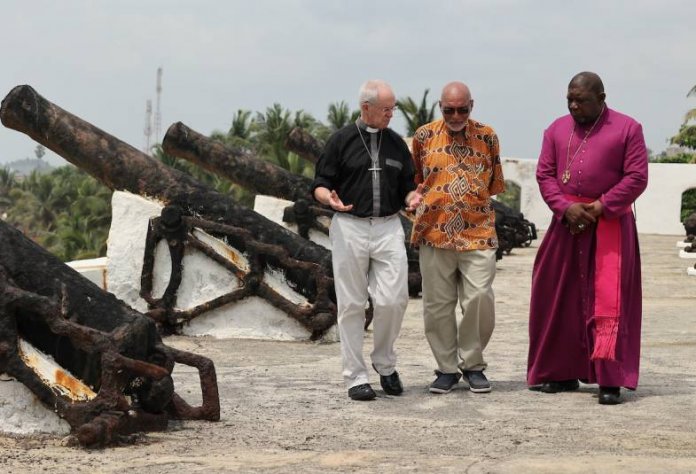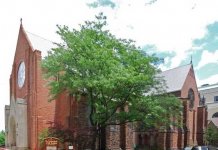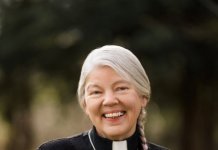Read Archbishop Justin’s article for the Church of England Newspaper on the new Fund for Healing, Justice and Repair
In 2023 the Anglican Consultative Council (about 120 people from each Province of the Anglican Communion, lay, clergy and Bishops) had its three-yearly meeting in Accra in Ghana. One day we went down to a former British fort, Cape Coast Castle, where slaves were held before transportation across the Atlantic. It was a blisteringly hot day, the beaches were white and the sea blue.
The fort had all that you might expect. There were slave dungeons, dark and fetid, a dock for slave ships.
Then, the shock. Immediately above the biggest dungeon was a Church of England chapel for the British community. They would have heard the groans from below as, each evening, they sang the words of the Magnificat.
Or when Colossians 3:11 was read out:
Where there is neither Greek nor Jew, circumcision nor uncircumcision, Barbarian, Scythian, bond nor free: but Christ is all, and in all.
To be there above the dungeons I had just visited, the floors of today still formed of hard packed human excrement of those Enslaved persons, was a reminder that the abomination of transatlantic chattel slavery was and has always been blasphemy: those who imprisoned men and women in those dungeons saw them, and treated them, as less than human.
Our visit to Cape Coast Castle occurred soon after the Church Commissioners for England published their report on their links to Transatlantic Chattel Slavery, an investigation initiated in 2019. Back then, a query raised by the Audit and Risk Committee of the Church Commissioners, the in-perpetuity endowment fund, established in 1704, which supports the mission of the Church of England in England, initiated a decision by its Board to investigate those links.
Why?
The Church Commissioners is a leading impact investor with a responsibility to support and promote the flourishing of every human being, and of the planet. “Respect for People” is one of its responsible investment principles. They felt that understanding their own history would help them to better understand the organisation in the present. It would position them to make good decisions for and in the future that would live up to their ambitions to continue to be a leading impact and Christian faith-based investor.
When it reported its findings in February 2023, its response included the proposal to set aside £100 million – 1% of its fund – to invest in a new in perpetuity investment fund; and to use its influence and convening voice to encourage others with a similar history, or who simply have a passion for truth, justice and healing, to co-invest to bring the fund to at least £1 billion.
It then commissioned an independent Oversight Group to provide recommendations on how it should next act. The Oversight Group published its suite of recommendations on 4 March 2024. They suggested that the new in perpetuity fund should be called the “Fund for Healing, Repair and Justice”. They challenged the Church Commissioners to stay strong in its original ambition to use its influence and convening power to raise £1 billion. Since then, there has been unhelpful and often inaccurate commentary in the media, so it’s important to get the facts straight.
The Church Commissioners is a Charity overseen by the Charity Commission, independent of the Church of England’s main charities at national and local level. The Commissioners are trustees and the General Synod has no jurisdiction over them. The CofE is not centralised; Bishops or Archbishops cannot make these decisions, quite rightly.
The Church Commissioners has always been clear that the issue is the underlying mindsets and attitudes that produced Transatlantic Chattel Slavery – the entitlement to commodify, exploit and destroy God’s image bearers so that a relative few can profit and flourish. These mindsets and attitudes are still very much with us today, and still blighting the lives of millions of people of African descent. These same mindsets and attitudes destroyed the lives of many other communities around the world, and are still blighting the lives of millions of all backgrounds and ethnicities around the world today.
So let us be clear.
The Church Commissioners action is not about reparations on account of inherited guilt; it is about living up to its responsibility in the present as a leading impact investor to help create a world that promotes human flourishing for all.
The new Fund for Healing, Repair and Justice has an invaluable catalytic potential to help change the very mindsets and attitudes that produced Transatlantic Chattel Slavery, and so many other atrocities around the world, and to seek that they do not happen again. So this is about setting up a fund which seeks justice for all. This isn’t a zero-sum game. It’s about mutual flourishing for all God’s children. Through the power of example, however messy, difficult and imperfect, the fund seeks to create a model that could be leveraged elsewhere.
The new Fund will be used strategically to accelerate learning and deepen understanding of the historical forces that produced the economy, the institutions, the society and the culture we have today. Understanding our past helps us all to better understand our present and make better decisions that would lead to human flourishing for all.
The innovations and interventions developed through the Fund for Healing, Repair and Justice, while focussing initially on those of African and Caribbean descent affected by the legacy of Chattel Slavery, in the long run must also be scalable to other historically oppressed groups. The benefits will reach far and wide.
In England, we must proudly acknowledge the many who worked heroically to end the slave trade and eventually slavery itself. That is a cause for thanksgiving. But as Christians we do not believe in moral balance sheets where good deeds are weighed against bad ones. We believe in sin and righteousness, and that the latter does not purge the former unless it is God’s righteousness in Jesus. Where any of us, or all of us collectively, have sinned and we know about it, then the answer is repentance, shown in action; look at Jesus and Zachaeus in Luke 19: 1-9. The Old and New Testaments speak of historic sin needing recognition and repentance. We cannot double down and perpetuate sin.
Oh and by the way, the Church certainly does not apologise for the gospel.
The General Synod and the Vision and Strategy of the Church of England starts with the Five Marks of Mission, the first of which is proclaiming the gospel. Evangelism, prayer and reconciliation have been the three priorities of my time as Archbishop. I seek to preach the gospel in season and out. But the Church must repent of the manipulation of the gospel, the use of force in evangelism, and abusing power to get converts. And we must repent of spreading a message that dehumanised and misrepresented people of African descent.
The Oversight Group’s recommendation 32, seemingly calling for apologies where the spreading of the gospel is concerned, was worded in a way that was open to misinterpretation. However, they confirmed to us that their recommendations do not call for any apology for anyone spreading the gospel anywhere. They, like us, believe that repentance starts with honesty and transparency about the Church’s actions in purporting to spread the gospel in a way that caused harm to people of African descent.
The actions we have taken are challenging and complex. Acting on them will be difficult, but necessary. We must put the mission of Jesus ahead of our own advantage and comfort. We must proclaim the gospel of Jesus Christ with assurance, and back up our proclamation with actions that show that we believe and trust that gospel and its implications.










